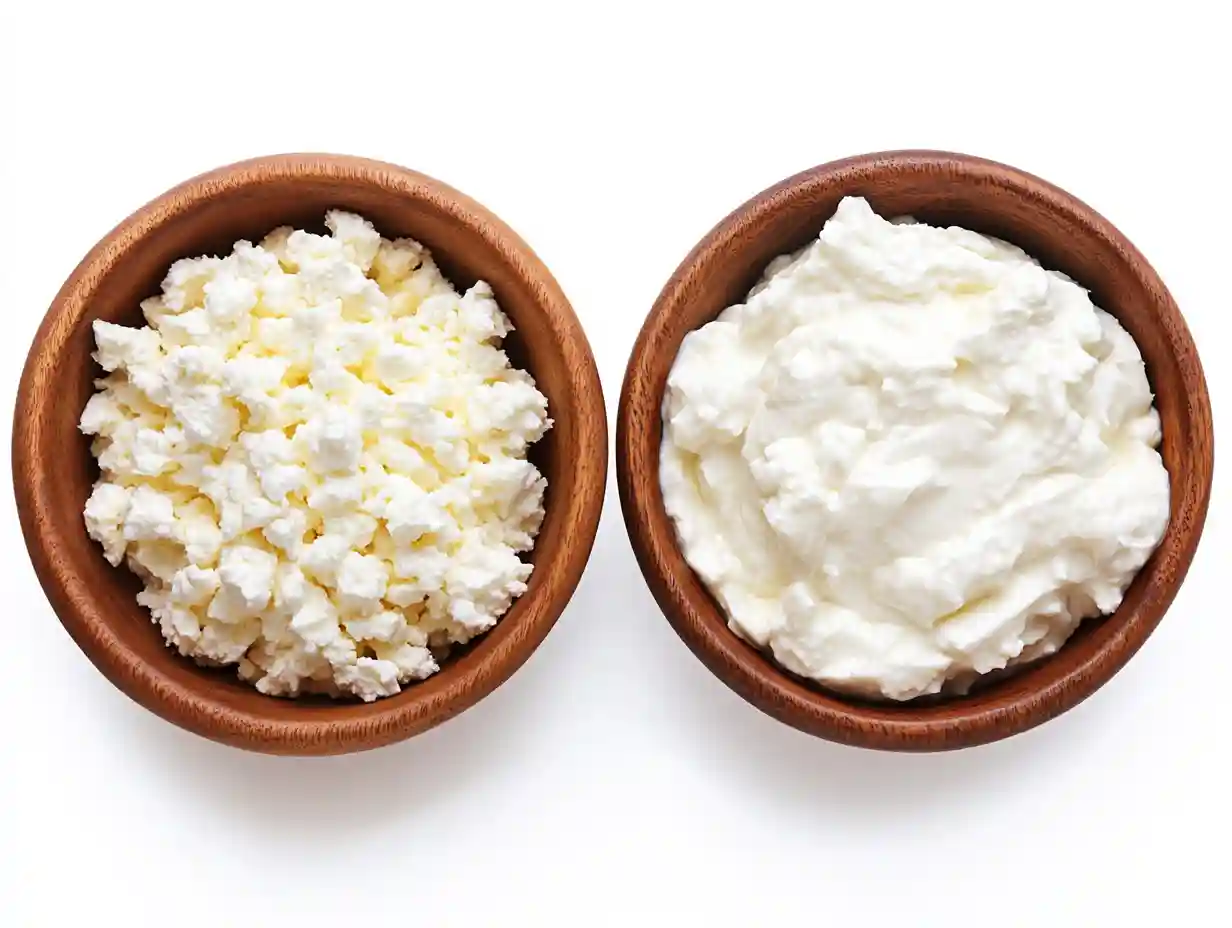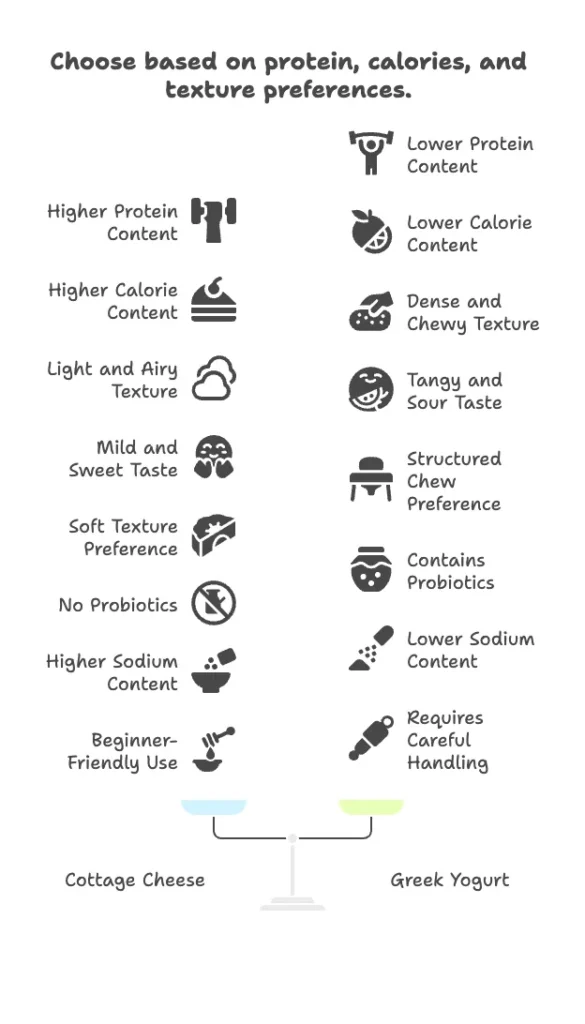Introduction
If you’ve ever baked protein bagels, you know the choice of base can make or break the final result. Two contenders stand out: cottage cheese and Greek yogurt. Both promise high protein and a creamy texture, but which one works best for baking?
This article breaks down a key comparison from our ultimate guide to high-protein breakfasts. We’ll cover everything you need to know about cottage cheese vs Greek yogurt, from taste and texture to nutrition and baking performance. Whether you’re looking to power up your breakfast or find the best ingredient for muscle-building meals, this side-by-side of cottage cheese vs Greek yogurt in protein bagels will help you decide. Let’s see who wins in the ultimate bagel battle: cottage cheese vs Greek yogurt in protein bagels.
Understanding how cottage cheese vs Greek yogurt impacts texture and protein quality will help you bake smarter and eat better.
Table of Contents
Bagel Love and My Grandma’s Kitchen
Cottage Cheese vs Greek Yogurt: Why Protein Bagels Matter
Hi there! I’m Emily, the heart behind Kitchen Bites Daily. I still remember sitting on a wooden stool in my grandma’s kitchen, watching her knead dough with hands that told stories of tradition and love. Her bagels weren’t packed with protein, but they were full of flavor. Fast forward to today, and I’m crafting my twist, protein bagels that fit modern goals without sacrificing comfort.
Protein bagels became my go-to when I started prioritizing simple, nourishing meals. With just a few ingredients, I could whip up something that satisfied cravings and supported my fitness routine. But soon I stumbled on the great question: Should I use cottage cheese or Greek yogurt? That one choice changes everything.
I started experimenting and realized the answer wasn’t just about protein numbers. It was about taste, structure, and how each one held up in the oven. The cottage cheese vs Greek yogurt in protein bagels debate became a real kitchen showdown.

Cottage Cheese vs Greek Yogurt in Protein Bagels: 1 Clear Winner
Ingredients
- 1 cup all-purpose flour
- 2 tsp baking powder
- 1/2 tsp salt
- 3/4 cup cottage cheese or Greek yogurt
- 1 egg for egg wash
- Optional toppings: sesame seeds garlic flakes, everything seasoning
Instructions
- Preheat oven to 375°F (190°C) and line a baking tray with parchment paper.
- In a bowl, mix flour, baking powder, and salt.
- Add cottage cheese or Greek yogurt and mix into a dough.
- Knead the dough lightly until just combined.
- Divide into 4 equal parts and shape into bagels.
- Brush with egg wash and add toppings if desired.
- Bake for 22–25 minutes until golden brown.
- Cool slightly before serving.
Notes
Nutrition
How Greek yogurt and cottage cheese changed the game
Greek yogurt and cottage cheese both offer creamy textures, tangy flavors, and high protein, but they behave differently when baked. I found that Greek yogurt created dense, chewy bagels, while cottage cheese made them moist and slightly airy. Each has its strengths depending on your texture preferences and nutritional goals.
This blog is more than just recipes; it’s about choosing the right tools for your kitchen lifestyle. I’ll walk you through everything I learned, from nutrition breakdowns to how these ingredients affect rise, chew, and satisfaction. And I’ll also link to a few of my other favorites, like my cottage cheese flatbread, so you can try both ingredients in different dishes.
Let’s explore the nutrition facts and protein content behind the cottage cheese vs Greek yogurt in protein bagels decision.
Comparing Protein and Nutrition in Bagel Recipes
Cottage cheese vs Greek yogurt in protein count
When choosing between cottage cheese and Greek yogurt for protein bagels, it all starts with the numbers. In just half a cup, low-fat cottage cheese delivers roughly 13 to 14 grams of protein. The same amount of plain nonfat Greek yogurt offers around 10 grams. If you’re chasing protein content, cottage cheese gives you a noticeable edge.
Beyond protein, consider the difference in consistency. Cottage cheese contains curds, which contribute to a softer, moister dough. Greek yogurt is thicker and creates a more structured dough. This typically means cottage cheese bagels turn out lighter and fluffier, while those made with Greek yogurt are denser and more chewy. For those trying to balance high protein with tender texture, cottage cheese might be the smarter option.

It’s also worth noting that cottage cheese typically has more sodium than Greek yogurt. However, this helps add flavor without relying on extra salt in the dough. Some brands like Daisy and Good Culture offer high-protein, low-sodium options that work beautifully in bagels.
On the flip side, Greek yogurt often includes live probiotics that support gut health. If digestion is a priority, Greek yogurt is a great addition to your baking. For those focused on total protein and a creamy bite, cottage cheese wins. If you’re balancing gut support and a chewy finish, Greek yogurt might suit you best.
Calories, texture, and how they affect baking
The calorie count is another important factor. Per half-cup, cottage cheese contains roughly 90 to 110 calories, depending on the brand and fat level. Greek yogurt of the same volume usually falls between 80 and 100 calories. While the difference is small, it can matter when you’re tracking macros or aiming for weight loss. This is especially noticeable in the cottage cheese vs Greek yogurt texture trade-off, where softness and chewiness matter.
In baking, those slight differences make a big impact. Cottage cheese adds moisture and lightness to the dough. It can reduce the need for oil or extra eggs. Greek yogurt adds structure and tang but may require more baking powder or flour to achieve the same lift. If you’re looking for a lighter texture without sacrificing rise, cottage cheese gives you more flexibility.
Bagels made with cottage cheese also tend to have a golden, softer crust when baked. Greek yogurt versions offer a chewier, firmer exterior. Both work well, but your choice depends on the mouthfeel you prefer.

Cottage Cheese vs Greek Yogurt: Which Makes the Best Bagels?
Texture: Chewy vs Airy – What’s the difference?
Texture can make or break your bagel experience. For anyone comparing cottage cheese vs Greek yogurt in protein bagels, texture becomes one of the biggest deciding factors. Cottage cheese bagels tend to have a lighter, more tender crumb. During baking, the curds gently break down, forming tiny air pockets that contribute to a softer interior. In the cottage cheese vs Greek yogurt comparison, if you love a soft, pull-apart inside with just the right amount of give, cottage cheese delivers.
Greek yogurt creates a firmer dough. The bite is dense and satisfyingly chewy, much like a classic New York-style bagel. If that’s your style, Greek yogurt may be your go-to. But there’s a tradeoff. That same chewiness can turn dry if overbaked or if the dough lacks enough moisture.
Bagels made with cottage cheese are also more forgiving. Even beginners can shape and bake a decent batch without worrying about overmixing. Working with Greek yogurt dough requires a bit more finesse: you’ll likely need extra flour to manage stickiness and a careful hand to prevent a tough exterior.
Prefer a light, fluffy bagel that stays soft even after reheating? Cottage cheese is your best bet. For a bagel that holds up to heavy toppings and feels like the classic deli version, Greek yogurt has the edge. You can also try a mix of both to balance chewiness and softness in a single recipe.
Flavor profiles and pairings for toppings
Cottage cheese has a mild, almost sweet flavor, especially when using low-sodium or whipped versions. This neutral base makes it versatile for both savory and sweet toppings. Try almond butter and banana for a post-workout snack, or top it with smoked salmon and dill for a brunch-ready option.
Greek yogurt has a distinct tang that gives the bagels a sharper flavor. That slight acidity pairs well with savory toppings like avocado, turkey slices, or egg whites. However, it can clash slightly with sweet toppings unless balanced with honey or berries.
One more thing, Greek yogurt tends to absorb flavors during baking. One overlooked difference in cottage cheese vs Greek yogurt is how each base handles sweet vs savory toppings. If you’re adding spices like onion, garlic, or sesame to the dough, they’ll come through more clearly in Greek yogurt bagels. Cottage cheese allows toppings to stand out after baking rather than blending into the dough.
Think about your go-to topping routine. If you like flexibility and a softer bite, cottage cheese may be a better base. If you prefer a tangy, robust flavor to carry savory toppings, Greek yogurt wins. Either way, you can’t go wrong pairing your bagel with options from our Healthy Spreads and Toppings collection.
Cottage Cheese vs Greek Yogurt: Which Fits Your Goals?
Weight loss, muscle gain, and satiety effects
Choosing between cottage cheese and Greek yogurt for protein bagels often depends on your health goals. If you’re aiming for weight loss, cottage cheese may help you feel fuller longer. It’s rich in casein protein, which digests slowly and keeps hunger at bay. This slow-digesting protein also makes it ideal for a late-morning meal or a post-workout bite that powers you through the day.
Greek yogurt also supports satiety thanks to its high protein content, though slightly lower than cottage cheese. However, it often contains probiotics, which may benefit digestion and metabolism. For anyone trying to balance gut health with protein intake, Greek yogurt is a solid option.
For muscle gain, cottage cheese has a slight advantage. Not only does it have more protein per cup, but it also includes higher levels of leucine, a key amino acid for muscle repair. Top a cottage cheese bagel with lean protein like eggs or smoked salmon, and you’ve got a high-impact, muscle-repairing meal perfect for post-workout recovery.

If your priority is flavor and variety, Greek yogurt is versatile but might fall short when you’re targeting high protein without adding powders. Cottage cheese wins for those looking to boost protein with whole foods and minimal ingredients.
Final verdict + recipe recommendation
So, which ingredient comes out on top in the cottage cheese vs. Greek yogurt showdown for protein bagels? If you’re looking for higher protein, softer texture, and a forgiving dough, cottage cheese is the clear winner. It’s beginner-friendly, yields soft and moist bagels, and complements both savory and sweet flavors with ease.
Greek yogurt holds its own when you’re after a chewy, structured bagel with a tangy bite. It’s great for savory meals and works best if you’re looking for a New York–style texture.
My verdict: use cottage cheese when protein and moisture are top priorities, and use Greek yogurt when you want a firmer texture and extra tang. You can even mix them for the best of both worlds.
If you’re ready to try it yourself, my Cottage Cheese Protein Bagels recipe walks you through every step with tips for perfect baking every time.
Conclusion: The Battle of Protein Bagel Bases
Cottage cheese vs Greek yogurt in protein bagels isn’t a one-size-fits-all debate. It comes down to what matters most to you: protein content, taste, texture, or digestive benefits. Cottage cheese offers more protein, a lighter bite, and reliable baking results. Greek yogurt brings chewiness, tang, and gut-friendly probiotics.
Both are excellent choices and far better than cream cheese or low-protein spreads. When it comes to cottage cheese vs Greek yogurt, you don’t have to choose just one. Experiment with both and decide which suits your routine best.
FAQ: Cottage Cheese vs Greek Yogurt
Is cottage cheese or Greek yogurt better for protein?
Compared to Greek yogurt, cottage cheese delivers a bit more protein per serving. It’s especially rich in casein, which digests slowly and helps maintain satiety.
What is a good protein topping for bagels?
Great protein toppings include smoked salmon, turkey breast, scrambled eggs, and cottage cheese with chives. For a plant-based option, try hummus with hemp seeds.
What has more protein, cream cheese or Greek yogurt?
In the context of cottage cheese vs Greek yogurt, Greek yogurt easily outpaces cream cheese in protein, half a cup offers around 10 grams, while cream cheese delivers just 2 to 3 grams.
What is the difference between cottage cheese and Greek yogurt?
Cottage cheese is chunkier, higher in sodium, and rich in slow-digesting casein protein. Greek yogurt is creamier, tangier, and typically contains gut-friendly probiotics. Each brings unique benefits, depending on your nutrition goals.
Is cottage cheese good for pregnancy?
Yes, cottage cheese can be an excellent food during pregnancy, provided it is made from pasteurized milk. It provides an excellent source of protein, vital for your baby’s growth, and calcium, which helps build strong bones. Be sure to check the label to confirm it is pasteurized.
Why do gym people eat cottage cheese?
Gym-goers and athletes often eat cottage cheese for two main reasons:
– High Protein Content: It’s packed with protein, which is vital for muscle repair and growth after a workout.
– Slow-Digesting Casein: It is primarily made of casein protein, which digests slowly. This provides a steady supply of amino acids to the muscles for hours, making it an ideal snack before bed to prevent muscle breakdown.
Is cottage cheese a probiotic like yogurt?
No, most standard cottage cheese is not a probiotic food like yogurt, as the production process typically destroys the live cultures. However, some brands now add live and active cultures back into their cottage cheese after production. If you’re seeking probiotics, you must check the label for phrases like “contains live cultures.” Otherwise, Greek yogurt is a more reliable source.
